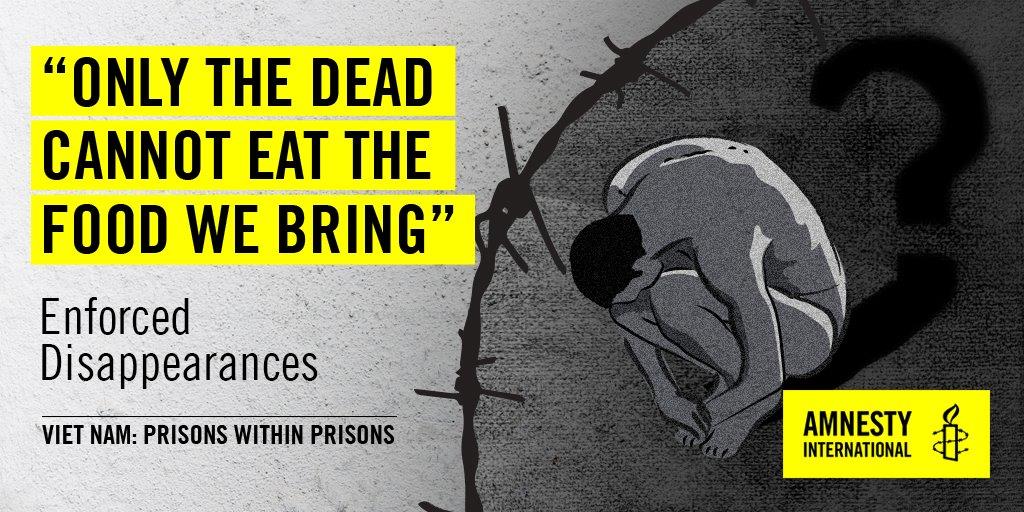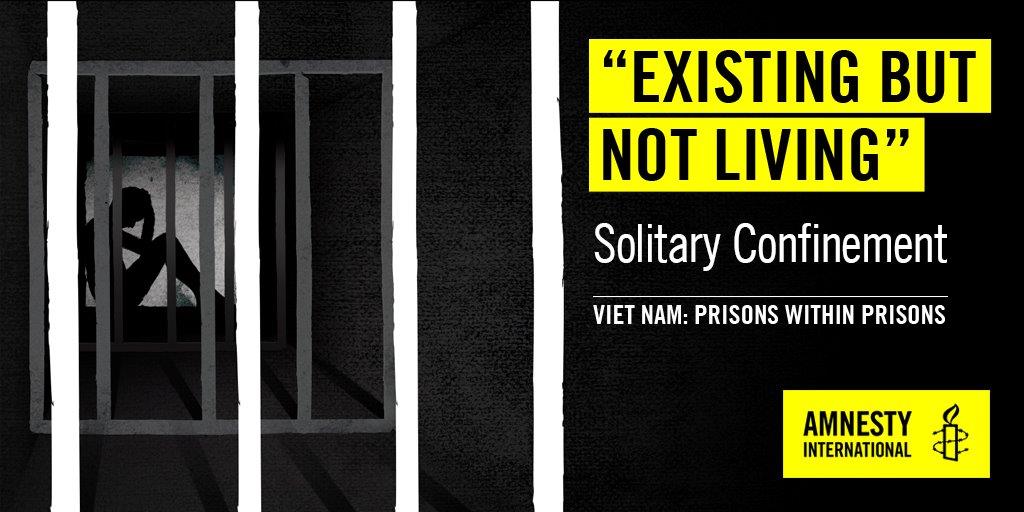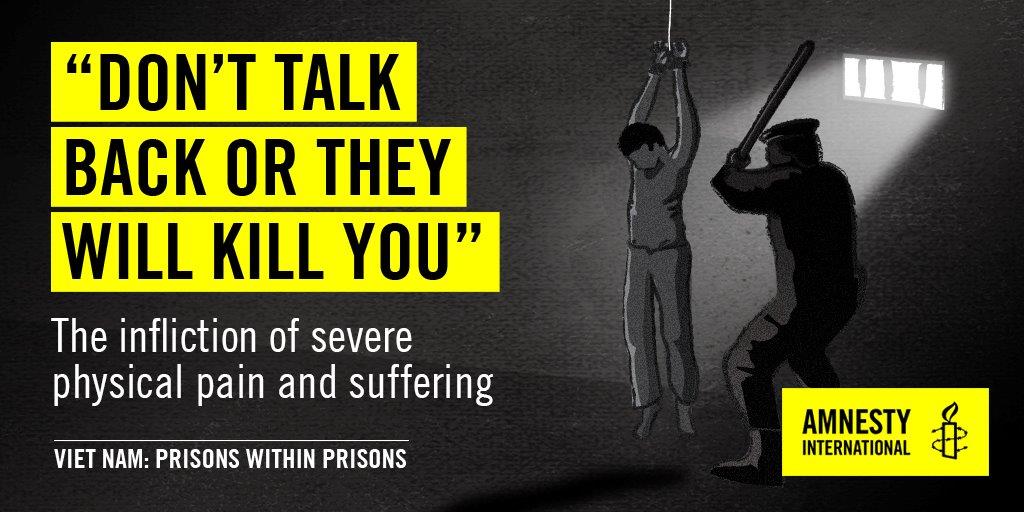Life in prison is hard. I fell into despair. I was in this situation because I was trying to be a good citizen, to help people according to the law…But I was arrested and put in prison. I felt like I was in a dark tunnel with no way out
Pham Thi Loc, one of several former prisoners of conscience interviewed by Amnesty International for new report
A new report published by Amnesty International today casts a rare light on the torture and other harrowing treatment of prisoners of conscience locked up in Viet Nam’s secretive network of prisons and detention centres.
Prisons within Prisons: Torture and ill-treatment of prisoners of conscience in Viet Nam details the ordeals endured by prisoners of conscience in one of the most closed countries in Asia, including prolonged periods of incommunicado detention and solitary confinement, enforced disappearances, the denial of medical treatment, and punitive prison transfers.
“Viet Nam is a prolific jailer of prisoners of conscience; this report offers a rare glimpse at the horror that those prisoners face in detention,” said Rafendi Djamin, Amnesty International’s Director for South East Asia and the Pacific.
“Viet Nam ratified the UN Convention against Torture in 2015. This in itself is not enough. In order to meet its human rights obligations, the authorities must introduce reforms in line with international law and ensure accountability for torture and ill treatment.”
The report is based on one year’s research – including more than 150 hours of interviews with 18 former prisoners of conscience, who spent between one month and a decade in incarceration.
Five of these men and women described to Amnesty International how they spent lengthy periods of time in solitary confinement in dark, fetid cells without access to fresh air, clean water and sanitation. Some were frequently beaten in clear contravention of global and national prohibitions on torture.
In June, Amnesty International was given a guided tour of a women’s prison facility in Bắc Giangprovince, a rare occurrence in a country that does not generally permit access to these facilities.
Enforced disappearances, and other acts of torture and other ill-treatment
For many of the former prisoners, their ordeal began from the moment that they were picked up by Vietnamese authorities. Four people told Amnesty International they were subjected to enforced disappearances.
‘Dar’, an ethnic Montagnard, was arrested for organizing peaceful demonstrations over religious freedom and human rights. For the first three months following his arrest, his family believed that he had been killed by the authorities, and his body dumped in the jungle. He was tried and convicted without legal representation and without his family present.
During the first 10 months of Dar’s five-year detention, he was kept in solitary confinement in a tiny cell, in total darkness and complete silence. For the first two months, he was hauled from his cell each day to be interrogated and beaten.
The beatings were carried out with sticks, rubber tubes, punches and kicks. The authorities used electric shocks and lit a piece of paper and ran it along the length of his leg, burning his skin. They asked him to assume painful stress positions for eight hours at a time.

On one occasion, he was hung from the ceiling by his arms for 15 minutes while the police beat him. The police officers would sometimes resume their beatings in the middle of night, when they stormed into his cell, apparently drunk.
For many of the former prisoners Amnesty International spoke to, the torture and ill-treatment was especially intense during pre-trial detention, as authorities aimed to extract a “confession”.
Incommunicado detention and solitary confinement
Every former prisoner of conscience that Amnesty International spoke to was subjected to a lengthy period of incommunicado detention – ranging from a month to two years. The right to access lawyers, medical professionals and family members is an important safeguard against torture and ill treatment, and critical to the right to a fair trial.
Two of the former prisoners were not told that their mothers had passed away, and were denied the chance to attend the funeral or mourn with their families.

Tạ Phong Tần, who was imprisoned for her blogging and advocacy activities, told Amnesty International that during her four years in prison, only her sister was allowed to visit her. After being denied access twice, on 30 July 2012 Tần’s mother Đặng Thị Kim Liêng self-immolated in front of a government office in protest, dying as a result of her burns.
While their relatives were being kept away, the prisoners were sinking deeper into isolation.
Phạm Văn Trội, another former prisoner of conscience, was cast into solitary confinement for over six months after he complained about fumes from a nearby brick kiln. He told Amnesty International that he was haunted by the thought that others might have died in the cell where he slept.
Abuse and denial
When prisoners have not been kept in isolation, they have been left vulnerable to abuse by other prisoners.
The doctor hit me in the mouth with a round piece of hard rubber. He knocked my teeth out, including a wisdom tooth. I lost so much blood I passed out again
Chau Heng, a Khmer Krom land rights activist
A number of former prisoners of conscience said they were cramped into small cells, where other prisoners known as “antennae” were believed to have colluded with prison authorities and incited to attack them. This kept them under the constant threat of imminent violence.
Withholding or denying medical treatment for periods of months and even years is another punitive measure prisoners described to Amnesty International. Interviewees also alleged that they were drugged by prison staff.
Chau Heng, a Khmer Krom land rights activist, told Amnesty International that during four months’ incommunicado detention prior to his trial, he was not only beaten unconscious several times, but also injected with unknown drugs at least twice – causing memory loss, rendering him unconscious and unable to speak or think clearly.

When he was taken to see the prison doctor, he opened his mouth to gesture that he could not speak. “The doctor hit me in the mouth with a round piece of hard rubber. He knocked my teeth out, including a wisdom tooth. I lost so much blood I passed out again.”
“Viet Nam’s authorities should seize the moment as the country’s amended penal and criminal procedures codes are being reviewed. Now is the time to make good on their international obligations, by bringing to book those responsible for torture and other ill-treatment, and ensuring this appalling practice ends,” said Rafendi Djamin.


